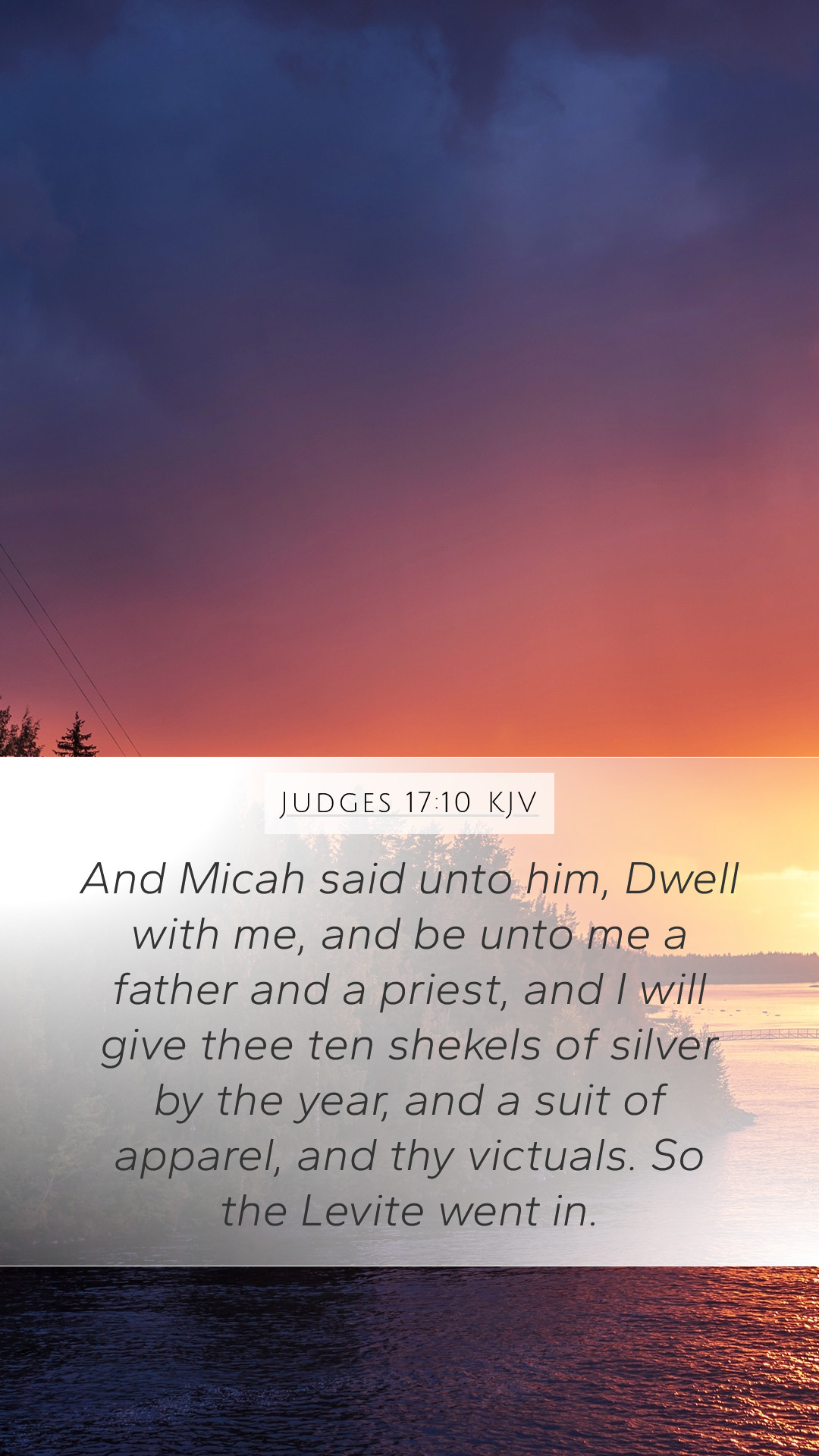Old Testament
Genesis Exodus Leviticus Numbers Deuteronomy Joshua Judges Ruth 1 Samuel 2 Samuel 1 Kings 2 Kings 1 Chronicles 2 Chronicles Ezra Nehemiah Esther Job Psalms Proverbs Ecclesiastes Song of Solomon Isaiah Jeremiah Lamentations Ezekiel Daniel Hosea Joel Amos Obadiah Jonah Micah Nahum Habakkuk Zephaniah Haggai Zechariah MalachiJudges 17:10 Meaning
What is the meaning of Judges 17:10?
And Micah said unto him, Dwell with me, and be unto me a father and a priest, and I will give thee ten shekels of silver by the year, and a suit of apparel, and thy victuals. So the Levite went in.
Judges 17:10 Bible Verse Meaning
Bible Verse Meaning: Judges 17:10
Judges 17:10 presents a significant insight into the dynamics of personal faith and religious practices during a tumultuous period in Israel's history. In this verse, we witness Micah offering his home to a young Levite, hoping to secure his services as a priest for his personal shrine. This action reflects a blend of familial devotion, individualism in worship, and the shifting landscape of Israelite spirituality.
Scripture Analysis and Commentary
The events depicted in Judges 17:10 arise during a time when "there was no king in Israel," indicating a lack of centralized authority and moral direction. This context is critical for understanding the verse's implications on personal and communal faith.
- Micah's Actions: Micah's desire for the Levite to work for him emphasizes a movement towards personal religious expression rather than adherence to the prescribed laws of worship set forth in the Mosaic Law.)
- The Role of the Levite: The young Levite is drawn into a situation that highlights the tensions between established worship practices and emerging personal spirituality. Indeed, the selection of this Levite signifies an abandonment of traditional roles for both the priesthood and worship itself.
Understanding the Meaning of Judges 17:10
According to Matthew Henry, this verse illustrates a departure from God’s prescribed order of worship. Micah's actions symbolize the individualism that led Israel away from divine commandments towards personal religion. Moreover, Albert Barnes points out that Micah's household religion was a significant deviation from established worship, showcasing the challenges of maintaining faith in a fragmented society.
Adam Clarke further expounds upon the implications of such actions. He suggests that Micah’s choice to employ a Levite as a priest reflects not merely a desire for religious connection, but also an indication of the spiritual confusion and moral degradation present in Israel at the time. The lack of a centralized form of worship led people like Micah to personalize their faith in ways that deviated from the Torah.
Application and Implications
This verse invites modern readers to reflect on how personal beliefs might sometimes supersede established doctrines. What does this mean for the modern believer? The commentary offers insights into various applications:
- Understanding the importance of community and corporate worship.
- Recognizing the pitfalls of individualistic faith where personal preferences can lead to doctrinal deviations.
- Encouraging inquiry into the historical and cultural context of scripture for deeper understanding.
Related Bible Cross References
- Judges 17:6 — "In those days there was no king in Israel; everyone did what was right in his own eyes."
- Exodus 28:1 — Discussing the role of the Levites.
- 1 Samuel 2:12-17 — The corruption of the priesthood and its impact on worship.
Conclusion: Seeking Understanding
The intersection of Bible verse meanings, interpretations, and exegesis continues to be vital for those engaging in Bible study insights. For many, Judges 17:10 serves as a reminder to pursue authenticity within personal faith while remaining anchored in scriptural truths. As believers navigate their spiritual journeys, this verse reiterates the importance of understanding Scripture’s historical context and its application to everyday life.


